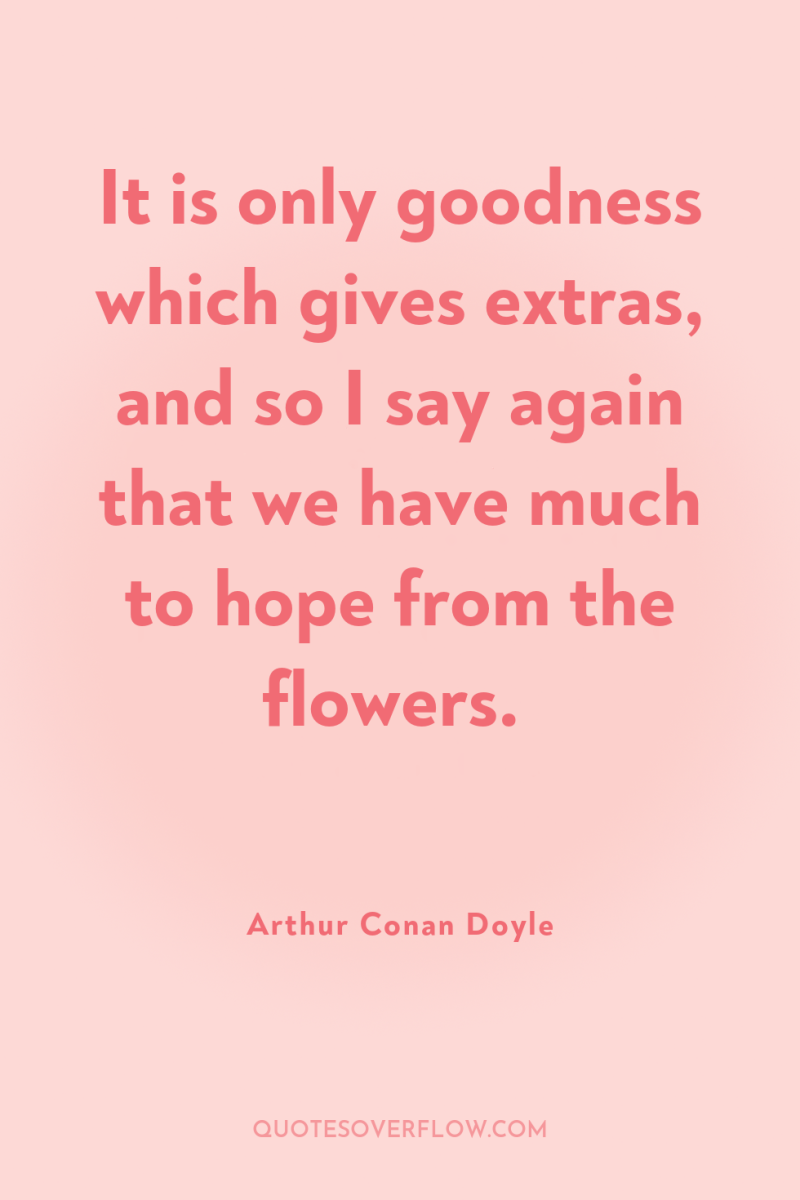
1
It is only goodness which gives extras, and so I say again that we have much to hope from the flowers.Arthur Conan Doyle
2
He always thought that Touie's long illness would somehow prepare him for her death. He always imagined that grief anf guilt, if they followed, would be more clear-edged, more defined, more finite. Instead they seem like weather, like clouds constantly re-forming into new shapes, blown by nameless, unidentifiable winds.Julian Barnes
3
Houdini, the magician who debunked magic, could not bear to see the great rationalist [Arthur Conan] Doyle enchanted by ghosts and frauds. And so he did what any friend would: He set out to prove spiritualism false and rob his friend Doyle of the only comforting fiction that was keeping him sane. It was the least he could do.John Hodgman
4
Desultory readers are seldom remarkable for the exactness of their learning.Arthur Conan Doyle
5
One likes to think that there is some fantastic limbo for the children of imagination, some strange, impossible place where the beaux of Fielding may still make love to the belles of Richardson, where Scott’s heroes still may strut, Dickens’s delightful Cockneys still raise a laugh, and Thackeray’s worldlings continue to carry on their reprehensible careers. Perhaps in some humble corner of such a Valhalla, Sherlock and his Watson may for a time find a place, while some more astute sleuth with some even less astute comrade may fill the stage which they have vacated.Arthur Conan Doyle
6
In the darkest corner of a darkened room, all Sherlock Homes stories begin. In the pregnant dim of gaslight and smoke, Holmes would sit, digesting the day's papers, puffing on his long pipe, injecting himself with cocaine. He would pop smoke rings into the gloom, waiting for something, anything, to pierce into the belly of his study and release the promise of adventure; of clues to interpret; of, at last he would plead, a puzzle he could not solve. And after each story he would return here, into the dark room, and die day by day of boredom. The darkness of his study was his cage, but also the womb of his genius.Graham Moore
7
On glancing over my notes of the seventy odd cases in which I have during the last eight years studied the methods of my friend Sherlock Holmes, I find many tragic, some comic, a large number merely strange, but none commonplace; for, working as he did rather for the love of his art than for the acquirement of wealth, he refused to associate himself with any investigation which did not tend towards the unusual, and even the fantastic.Arthur Conan Doyle
8
On Westminster Bridge, Arthur was struck by the brightness of the streetlamps running across like a formation of stars. They shone white against the black coats of the marching gentlefold and fuller than the moon against the fractal spires of Westminster. They were, Arthur quickly realized, the new electric lights, which the city government was installing, avenue by avenue, square by square, in place of the dirty gas lamps that had lit London's public spaces for a century. These new electric ones were brighter. They were cheaper. They required less maintenance. And they shone farther into the dime evening, exposing every crack in the pavement, every plump turtle sheel of stone underfoot. So long to the faint chiaroscuro of London, to the ladies and gentlemen in black-on-black relief. So long to the era of mist and carbonized Newcastle coal, to the stench of the Blackfriars foundry. Welcome to the cleasing glare of the twentieth century. .Graham Moore
9
Richard put away the Narnia books, convinced, sadly, that they were an allegory; that an author (whom he had trusted) had been attempting to slip something past him. He had had the same disgust with the Professor Challenger stories, when the bull-necked old professor became a convert to Spiritualistm; it was not that Richard had any problems believing in ghosts - Richard believed, with no problems or contradictions, in everything - but Conan Doyle was preaching, and it showed through the words. Richard was young, and innoncent in his fashion, and believed that authors should be trusted, and that there should be nothing hidden beneath the surface of a story.Neil Gaiman
10
Why, of course, if the reader were smart enough, he could figure the whole thing through after just the first few pages! But in his heart Arthur knew that his readers didn't really want to win. They wanted to test their wits against the author at full pitch, and they wanted to lose. To be dazzled.Graham Moore
11
Conan Doyle deluded a century of readers into thinking we're all deductive geniuses.Rob Thomas